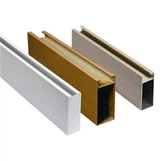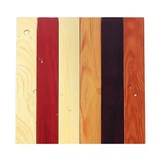Perforated aluminum veneer is a versatile and popular material in the construction and decoration industry. It offers not only aesthetic appeal but also functional benefits such as sound insulation and ventilation. As a perforated aluminum veneer supplier, I understand the importance of helping our customers extend the lifespan of this valuable material. In this blog post, I will share some practical tips and strategies on how to achieve this goal.
Understanding the Characteristics of Perforated Aluminum Veneer
Before we delve into the methods of extending its lifespan, it's crucial to understand the basic characteristics of perforated aluminum veneer. Perforated aluminum veneer is typically made from high - quality aluminum alloy sheets. These sheets are then perforated with various hole patterns and sizes to meet different design and functional requirements.
The aluminum alloy used in the veneer provides it with good corrosion resistance, light weight, and high strength. However, like any other material, it is still susceptible to damage under certain conditions. Factors such as environmental exposure, improper installation, and lack of maintenance can all affect its lifespan.


Proper Installation
The first step in extending the lifespan of perforated aluminum veneer is proper installation. A correct installation process ensures that the veneer is firmly fixed and can withstand various external forces.
- Surface Preparation: Before installation, the surface where the perforated aluminum veneer will be installed should be clean, dry, and flat. Any debris, dust, or unevenness on the surface can cause the veneer to be installed unevenly, leading to stress concentration and potential damage over time.
- Using the Right Fasteners: Selecting the appropriate fasteners is essential. Stainless - steel fasteners are often recommended because they have good corrosion resistance. Using low - quality or inappropriate fasteners can result in rusting, which may spread to the aluminum veneer and cause corrosion.
- Following Installation Guidelines: It's important to follow the manufacturer's installation guidelines precisely. These guidelines are based on extensive testing and experience, and they provide the best practices for ensuring a long - lasting installation. For example, maintaining the correct spacing between panels and using the right adhesive or sealant can prevent water infiltration and other problems.
Protection from Environmental Factors
Perforated aluminum veneer is often exposed to various environmental factors, which can have a significant impact on its lifespan.
- Corrosion Prevention: Although aluminum has a certain degree of corrosion resistance, in harsh environments such as coastal areas with high salt content in the air or industrial areas with high levels of pollutants, additional corrosion protection measures may be required. One common method is to apply a protective coating on the surface of the veneer. There are different types of coatings available, such as powder coatings and fluorocarbon coatings. Powder coatings are relatively inexpensive and provide good protection against general corrosion, while fluorocarbon coatings offer superior durability and weather resistance, making them suitable for more demanding environments.
- UV Protection: Ultraviolet (UV) rays from the sun can cause the color of the perforated aluminum veneer to fade over time. To prevent this, a UV - resistant coating can be applied. This coating helps to block the UV rays and maintain the color and appearance of the veneer for a longer period.
- Weather Resistance: Extreme weather conditions such as heavy rain, strong winds, and hail can also damage the perforated aluminum veneer. Ensuring that the installation is designed to withstand these conditions is crucial. For example, in areas prone to strong winds, the panels should be securely fastened and the joints should be well - sealed to prevent water and wind from getting behind the panels.
Regular Maintenance
Regular maintenance is another key factor in extending the lifespan of perforated aluminum veneer.
- Cleaning: Periodic cleaning is necessary to remove dirt, dust, and other contaminants from the surface of the veneer. Use a mild detergent and a soft cloth or sponge to clean the panels. Avoid using abrasive cleaners or tools that can scratch the surface, as scratches can provide entry points for corrosion.
- Inspection: Regular inspections should be carried out to check for any signs of damage, such as cracks, dents, or corrosion. If any problems are detected early, they can be repaired promptly, preventing further damage and extending the lifespan of the veneer. For example, if a small crack is found, it can be filled with an appropriate sealant to prevent water from seeping in.
- Sealant and Coating Inspection and Renewal: Over time, the sealant and coating on the perforated aluminum veneer may wear out. Inspect the sealant regularly and renew it if necessary. Similarly, if the protective coating shows signs of peeling or damage, it should be reapplied to maintain its protective function.
Storage and Handling
Proper storage and handling before installation also play an important role in ensuring the long - term performance of perforated aluminum veneer.
- Storage Conditions: When storing the veneer, it should be kept in a dry, well - ventilated area. Avoid storing it in direct contact with the ground or in areas prone to flooding. Stacking the panels properly to prevent deformation is also important. For example, use spacers between the panels to ensure even distribution of weight.
- Handling Precautions: During handling, care should be taken to avoid dropping or hitting the panels. Any physical damage during handling can weaken the structure of the veneer and reduce its lifespan. Use appropriate lifting equipment and ensure that the panels are handled gently.
Customization and Quality Assurance
As a perforated aluminum veneer supplier, we offer customized size options to meet the specific needs of our customers. Customization allows for a better fit and performance in different projects.
- Quality Control: We implement strict quality control measures throughout the production process. From the selection of raw materials to the final inspection of the finished products, every step is carefully monitored to ensure that the perforated aluminum veneer meets the highest quality standards. High - quality products are more likely to have a longer lifespan.
- Technical Support: We also provide technical support to our customers. Our team of experts can offer advice on installation, maintenance, and other aspects related to the perforated aluminum veneer. This support helps our customers make the most of our products and extend their lifespan.
Conclusion
Extending the lifespan of perforated aluminum veneer requires a combination of proper installation, protection from environmental factors, regular maintenance, and proper storage and handling. By following these tips, our customers can ensure that their perforated aluminum veneer remains in good condition for many years, providing both aesthetic and functional benefits.
If you are interested in our perforated aluminum veneer products or need more information on how to extend their lifespan, please feel free to contact us for procurement and negotiation. We are committed to providing high - quality products and excellent service to meet your needs.
References
- Aluminum Association. "Properties and Applications of Aluminum Alloys."
- ASTM International. "Standards for Aluminum Products in Construction."
- Manufacturer's Installation and Maintenance Guides for Perforated Aluminum Veneer.




